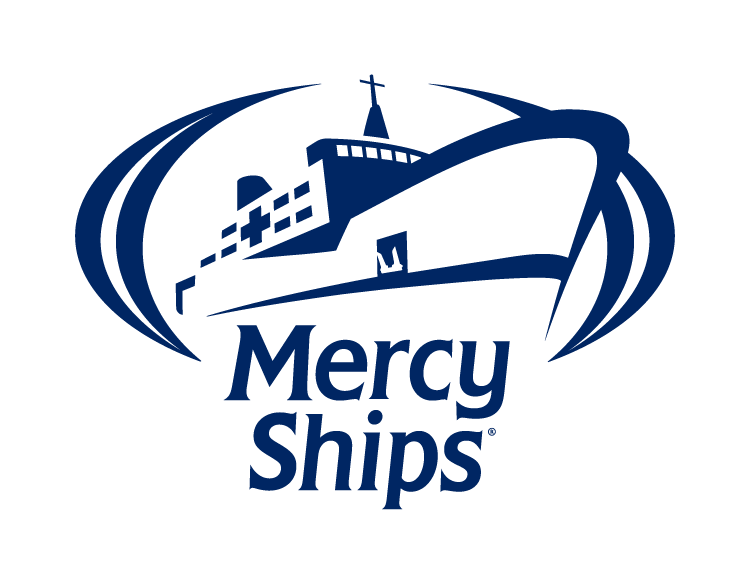Nearly 90% of the inhabitants of Africa have little to no access to a qualified doctor or hospital.
With the support of people like you, we deploy hospital ships to combat this overwhelming statistic.
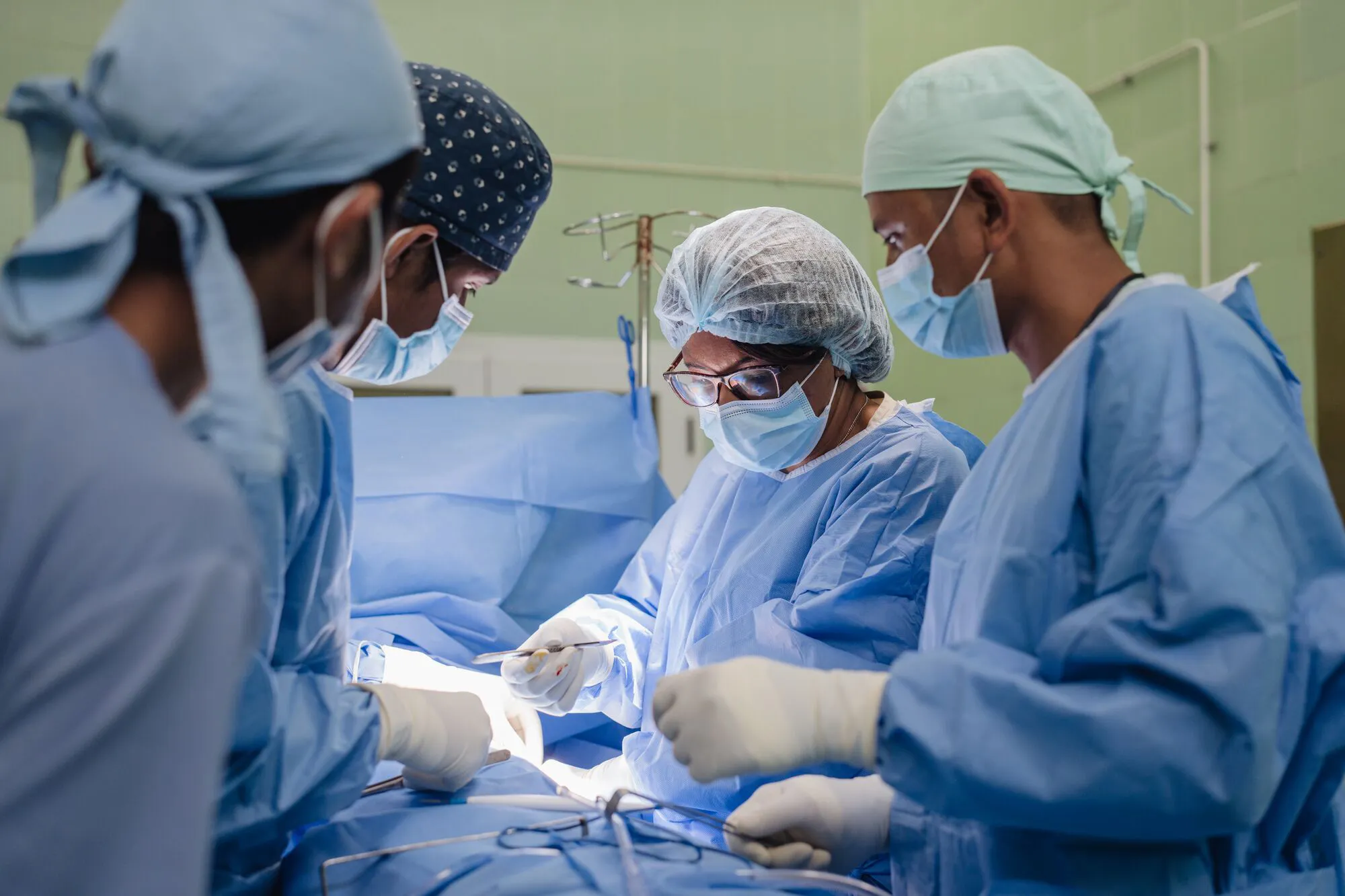
Surgeries
In developing nations, the lack of access to basic healthcare can have devastating outcomes. Mercy Ships provides free relief through specialized life-saving surgeries that restore hope. Patients recover under the care of our professionals on the hospital ship.
Maxillofacial
Craniomaxillofacial tumours, cleft lip and palate, and ear-nose-throat diseases are life-threatening conditions affecting children and adults throughout Africa. An uncorrected cleft palate makes it difficult, if not impossible, for a baby to suckle or drink from a bottle. Untreated benign facial tumours can grow to the point of suffocating the patient. Very often, when facing any facial deformity, the result is becoming a social outcast.
Plastic
Benign tumours, chronic ulcers, scars from serious wounds, and especially burn contractures (hardening of the skin that restricts movement) are all prevalent conditions in countries where machetes cause the most common fires, and most of the population uses firewood for cooking.
General
Due to superstitions, even hernias and goiters, which do not greatly impede physical activity, can lead to the sick being ostracized by their local communities, preventing children from attending school and adults from being able to work.
Blindness
Most blind people in the world -90%- live in developing countries where access to basic eye care is practically inaccessible. Ophthalmic surgeons from Mercy Ships perform critical surgeries for free.
Cataracts
Cataracts are the leading treatable cause of blindness worldwide. Not only that, but cataract blindness is curable, and vision can be restored through a low-cost intervention that takes about 20 minutes. Surgical interventions aboard Mercy Ships are carried out using the latest methods and technologies.
Corneal abnormalities and strabismus
Ophthalmic surgeons from Mercy Ships perform procedures to correct pterygium (abnormalities in the corneal area), strabismus, and eyelid deformations, as well as to remove deformed or non-functional eyeballs, replacing them with prosthetics.
Why it’s so important
Lack of mobility in a developing country becomes more than a disability. In many African cultures, those with birth defects or disfigurement from untreated injuries may be seen as cursed, and their physical anomaly turns a child or adult into an outcast.
Untreated Traumas
Many Africans who suffer traumatic injuries such as bone fractures do not receive proper medical attention, resulting in deformities and loss of mobility. Our orthopaedic team works to correct these deformities and restore as much mobility as possible for the patient.
Ponseti
Orthopaedic surgery requires general anaesthesia and a painful postoperative period of extended hospitalization. Ponseti method plaster casts can be used as an alternative or supplement to traditional surgical methods, requiring less or sometimes eliminating the need for surgery.
Why it’s so important
Women are often among the most disadvantaged in developing countries. Due to a lack of knowledge about obstetric conditions, they are frequently excluded by the community.
Uterine Prolapse
The exact causes are not yet known, but basically, women of any age can suffer from this dangerous condition, which involves the uterus loosening and floating inside the body. Surgery is almost always required to correct this condition.
Obstetric Fistula
Obstetric Fistula is a condition primarily caused by prolonged labour. Women in developing countries, due to a lack of adequate medical care, can endure labour for 2, 3, or even 4 days. The constant pressure from the baby’s body cuts off the blood supply to the pelvic region, damaging nerves and tissues, creating a hole that results in the leakage of urine and/or feces. As if the loss of their baby were not enough, the mother also becomes incontinent. Without access to sanitary products, urine leaks directly onto their clothing, leading people to reject them wherever they go. Obstetric Fistula surgeries repair these fistulas, allowing women to return to a normal life.
Improving the health of African women
In addition to Obstetric Fistula, there are many other obstetric conditions that women face in developing nations, such as uterine prolapse. This project focuses on three main areas:
1. Providing surgeries for patients from uterine prolapse or other gynaecological conditions.
2. Offering counselling to patients and their families to mitigate the emotional effects that may arise because of their condition.
3. Collaborating with local partners to conduct campaigns providing general information about prolapse and available surgical options.
Dental Clinic
Many residents of developing countries have never had the privilege of being treated by a dentist. Dental care is almost non-existent in much of West Africa, and in other countries visited by Mercy Ships, economic conditions make access to dental care impossible for most of the population.
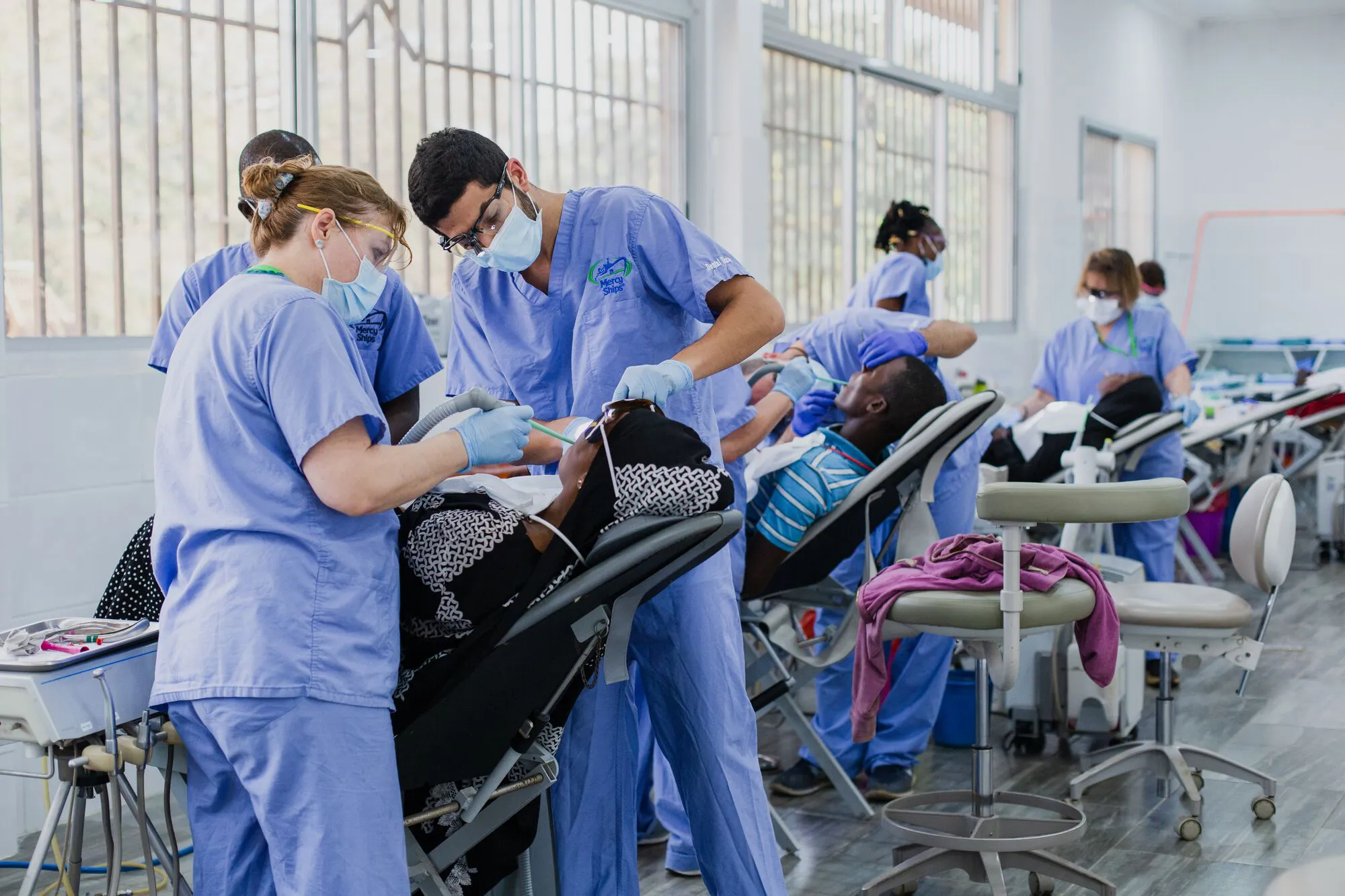
Education
The lack of oral hygiene and absence of dental treatment can lead to much more serious diseases, such as the condition known as Noma. The dental professionals at Mercy Ships works to improve oral health in developing countries through education on oral hygiene and training local professionals in the community.
Treatments
Mercy Ships operates dental clinics to provide care for those in need. Due to poor or nonexistent dental hygiene, extractions are common procedures. Additionally, we perform fillings, root canal treatments, partial dentures, and management of intraoral and extraoral odontogenic infections. Often, after receiving treatment, patients express their relief and gratitude by embracing the dentists.
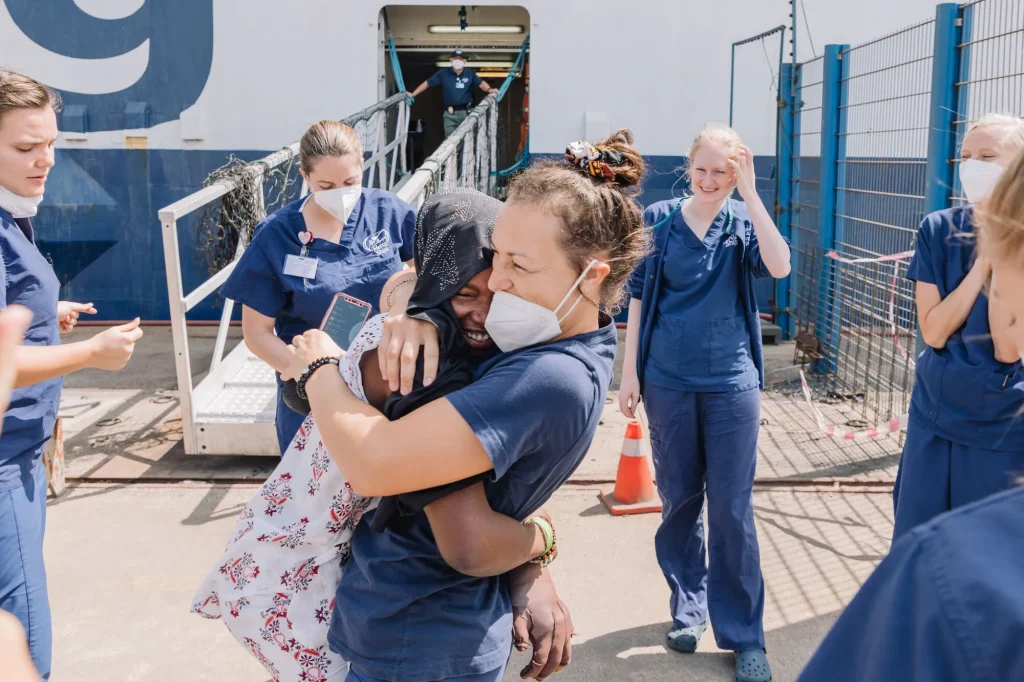
Helping Minds in Distress
In developing nations, individuals suffering from mental illnesses are often marginalized by their families and communities. Sometimes, a lack of understanding about these conditions can lead to further abuse. Few developing nations have facilities that offer mental health services, and what exists is generally inadequate. Primary health care workers are crucial for providing quality services, and the training programs we conduct for them significantly improve treatment.
Palliative Care
Unfortunately, not all individuals who come to our hospital ships with a physical or medical need can be helped through surgical care. For many, the ship arrives too late: their condition has progressed beyond the point where medical aid can cure them. While terminally ill patients experience physical, spiritual, and emotional pain, their families also suffer alongside them.
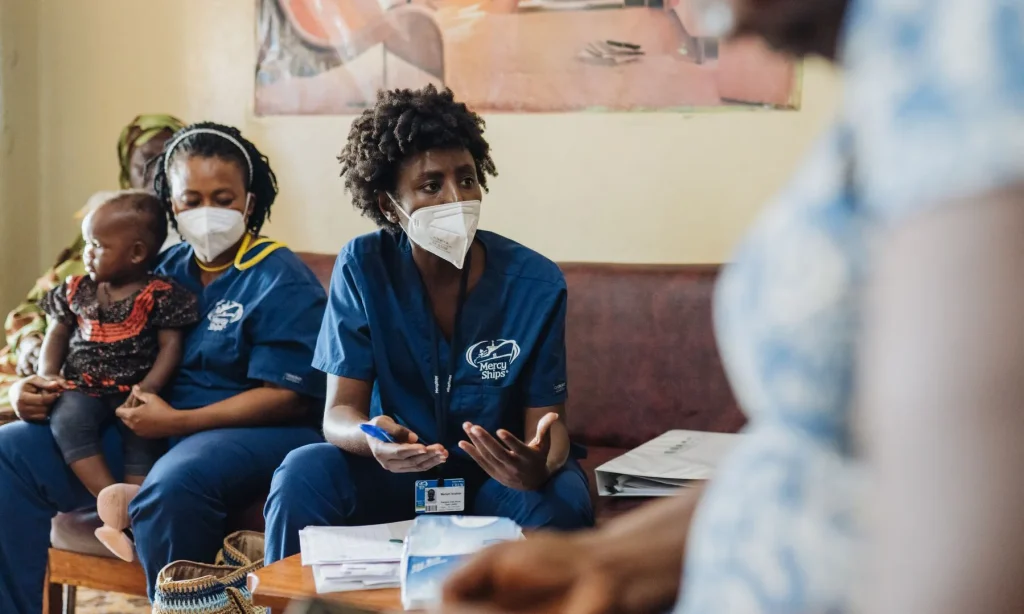
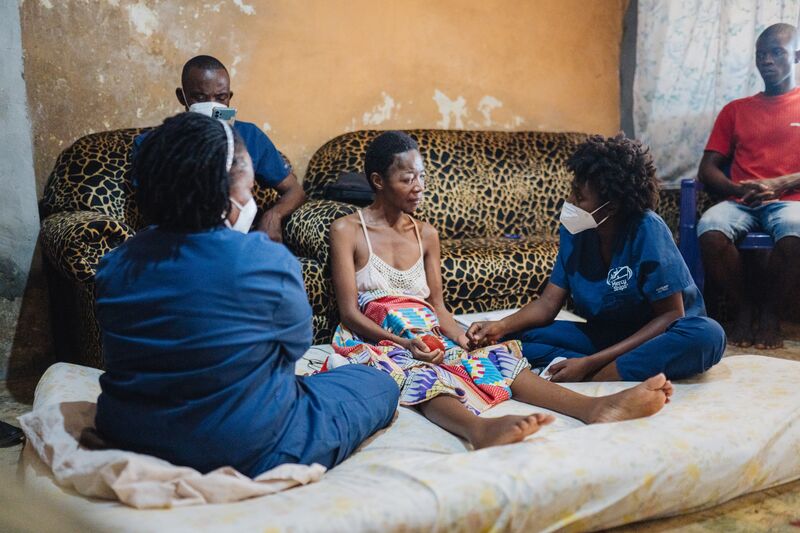
The Palliative Care Team of Mercy Ships helps these patients and their families during this delicate time. We train family members and caregivers to address the physical needs of those patients. Often, terminally ill patients are the main support of their families. In these cases, Mercy Ships works with surviving family members to develop new income opportunities. We follow the model of Jesus in caring tenderly for the dying patients and their grieving families, and we invite local religious leaders to offer spiritual and practical support.
Learn about the lives we change
The Strength of Unwavering Faith: Marie Elisa’s Story
2024: Lighthouses of Hope at Sea
A Bright and Brilliant Future for Alex
Donate Now
As volunteers on hospital ships, we travel to provide free world-class health services and safe surgical care. We are dedicated to strengthening local health systems, making a difference in communities with limited access to health.
